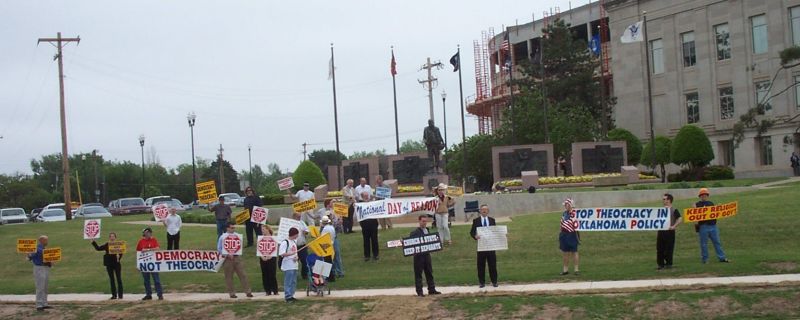Over at SkeptiSchism, my friend Jim has challenged the notion that atheism should be though of as a movement. I agree with him that such assumptions ought not go unquestioned, and I’d like to take up that challenge here. Charles Tilly (who literally wrote the book on social movements) maintains that there are three distinct aspects of a social movement: Campaigns, Repertoire, and Displays of Worthiness, Unity, Numbers, and Commitment (WUNC). I’m going to argue that the atheist community in the U.S. falls somewhat short in each of these categories, but not so far short as to disqualify it from being considered a movement for social reform.
Campaigns, according to Tilly, are sustained organized public efforts making collective claims of authorities. Examples of atheist or secular campaigns are few and far between, consisting primarily of efforts imploring people in positions of power to respect separation of church and state or to respect freedom of speech. Because of our nation’s uniquely Jeffersonian/Madisonian founding, atheists and other secularists often find ourselves arguing not for progressive change or radical reforms, but rather for a return to foundational first principles.
Repertoire of a social movement consists of some combination from among various forms of political action, such as special-purpose associations, public meetings, vigils, rallies, demonstrations, petition drives, statements to the media, pamphleteering, and so forth.

Displays of WUNC are the most detailed and demanding of the Tilly’s three-part definition of a social movement. They consist of ostentatious public showings of worthiness, unity, numbers, and commitment, and have been fleshed out as follows:
- Worthiness – sober demeanor; neat clothing; presence of clergy, dignitaries and mothers with children
- Unity – matching badges, headbands, banners, or costumes; marching in ranks; singing and chanting
- Numbers – headcounts, signatures on petitions, messages from constituents, filling streets
- Commitment – braving bad weather; visible participation by the old and handicapped; resistance to repression; ostentatious sacrifice, subscription, and/or benefaction
Now I’m not about to claim that the Reason Rally ticked every last one of these boxes, but I would claim that it got most of them. Freethinkers are always going to have some trouble with the unity component, and we aren’t terribly apt to sing along unless Greg Graffin is leading the audience. And you can forget about the clergy, unless Humanists and UU’s count.
All things considered, I would say that if American Atheism is not yet a social movement, it only misses the mark by a tiny bit. In any case, we have work to do.
